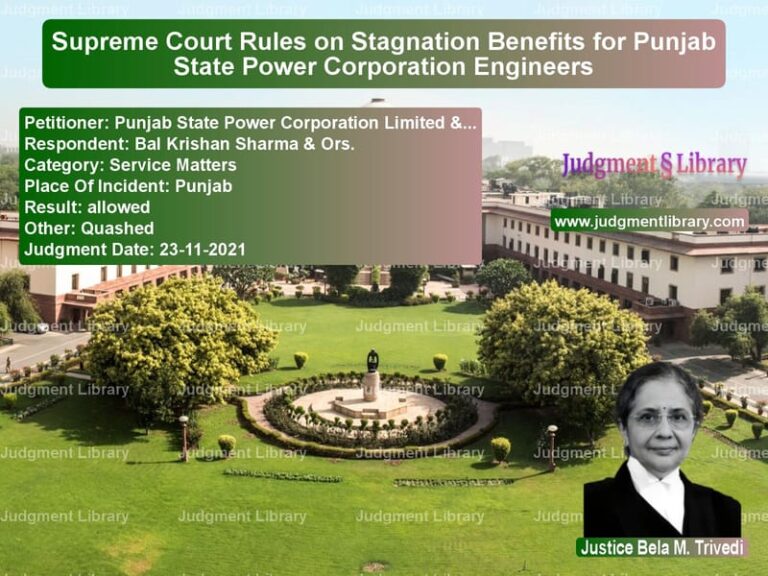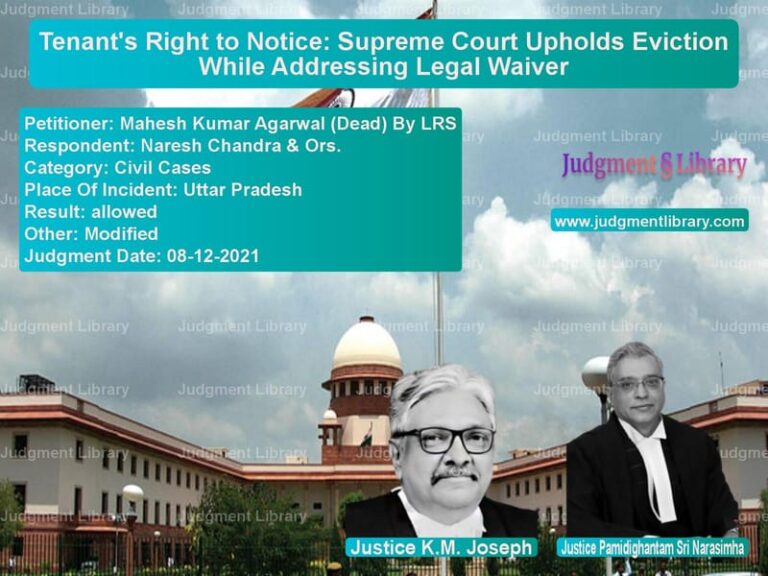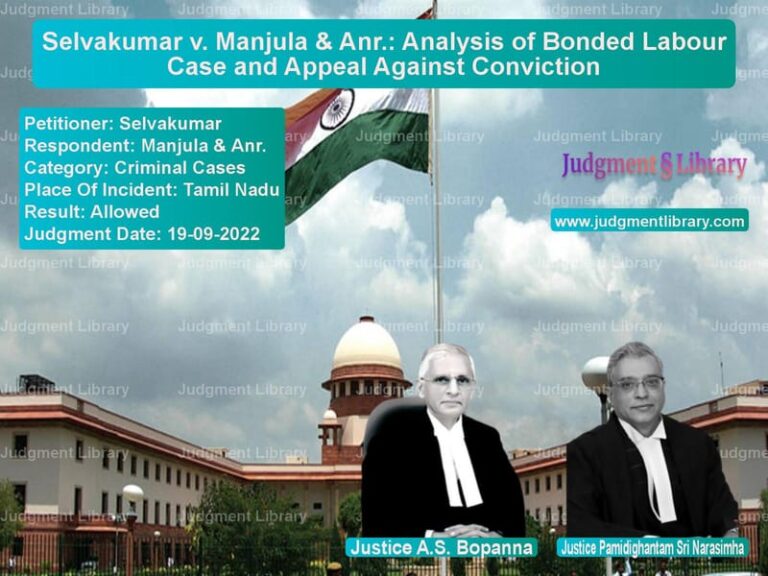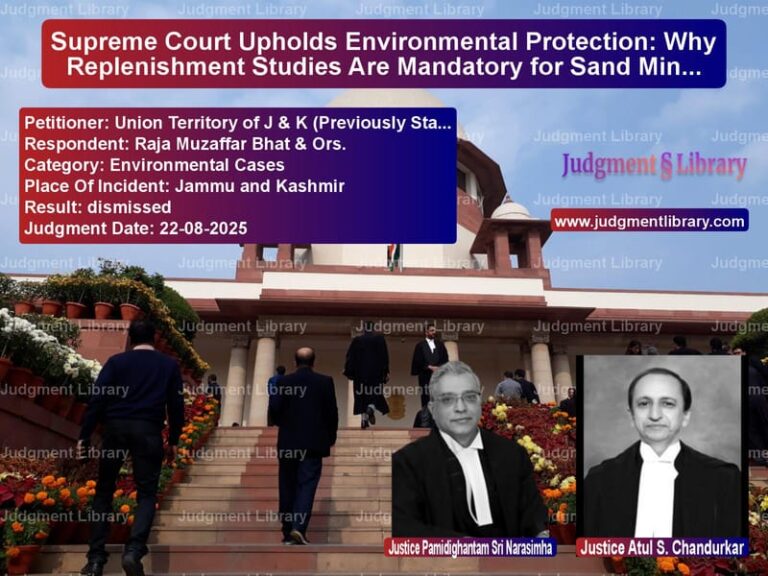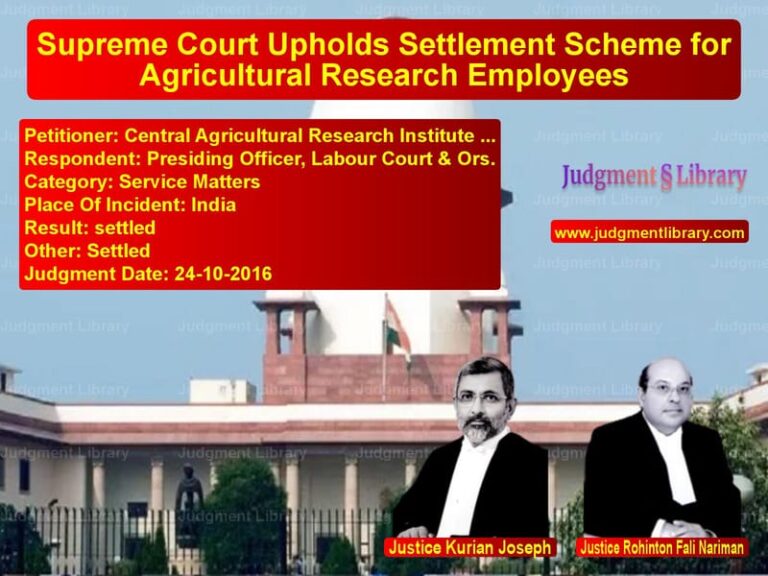Unsecured Creditors and Rehabilitation Schemes: Supreme Court’s Interpretation
The Supreme Court of India delivered a significant judgment in the case of Modi Rubber Limited v. Continental Carbon India Ltd., along with related appeals involving OCL India Limited, TVS Sewing Needles Ltd., and M/s. Titagarh Wagons Limited. These cases raised an important legal question regarding whether unsecured creditors have the right to opt out of a rehabilitation scheme approved by the Board for Industrial and Financial Reconstruction (BIFR) under the Sick Industrial Companies (Special Provisions) Act, 1985 (SICA).
The Court ruled that once a rehabilitation scheme under Section 18 of SICA is sanctioned by BIFR, it is binding on all creditors, including unsecured creditors, and they cannot opt out and claim full repayment after the company’s revival.
Background of the Case
Several appeals were clubbed together for consideration as they involved a common question of law regarding the rights of unsecured creditors in a rehabilitation scheme sanctioned under SICA.
- Modi Rubber Limited challenged a Delhi High Court judgment that allowed unsecured creditors to opt out of a rehabilitation scheme and claim full repayment after the company became financially viable.
- OCL India Limited contested a ruling that required it to stand in line with other unsecured creditors under the revival scheme.
- TVS Sewing Needles Ltd. appealed against a decision referring a similar issue to a larger bench.
- M/s. Titagarh Wagons Limited challenged a Madhya Pradesh High Court decision that relied on the Delhi High Court’s interpretation in favor of unsecured creditors.
Key Legal Issue
The core issue before the Supreme Court was:
Whether an unsecured creditor has the option not to accept the scaled-down value of its dues under a BIFR-approved rehabilitation scheme and instead wait until the scheme is fully implemented to claim the entire amount due?
Arguments by the Petitioners
The petitioners, led by Modi Rubber Limited and supported by other appellants, made the following arguments:
- Binding Nature of Rehabilitation Schemes: Once a scheme is sanctioned under Section 18(4) of SICA, it becomes binding on all stakeholders, including unsecured creditors. Allowing creditors to opt out would render the scheme unworkable.
- Purpose of SICA: The objective of SICA is to revive sick companies by providing a structured mechanism that includes financial sacrifices from creditors. If unsecured creditors are allowed to demand full repayment after revival, the entire rehabilitation process would be undermined.
- Legal Precedents: The petitioners cited previous Supreme Court judgments affirming that SICA overrides other laws, including the Companies Act, and that all creditors are bound by BIFR-approved schemes.
- Unsecured Creditors Are Not a Special Class: Unlike secured creditors or financial institutions, unsecured creditors do not have superior rights in the restructuring process. The law treats them equally with other creditors when a rehabilitation scheme is implemented.
Arguments by the Respondents
The respondents, mainly unsecured creditors, argued:
- Right to Full Repayment: The law does not explicitly force unsecured creditors to accept a reduced settlement. They argued that they should have the option to wait until the company recovers to claim full repayment.
- Article 300A of the Constitution: Scaling down debts without creditor consent amounts to deprivation of property without due process, violating Article 300A.
- SICA Does Not Explicitly Bind Unsecured Creditors: Unlike financial institutions that provide financial assistance under Section 19, unsecured creditors were not required to make sacrifices under the law.
Supreme Court’s Ruling
The Supreme Court overturned the Delhi High Court’s decision and ruled:
- BIFR-Approved Schemes Bind All Creditors: Section 18(8) of SICA explicitly states that once a scheme is approved, it is binding on all creditors, including unsecured creditors. Allowing any creditor to opt out would defeat the purpose of the law.
- Unsecured Creditors Cannot Opt Out: Accepting the argument that unsecured creditors can wait for full payment after rehabilitation would lead to financial instability, potentially causing companies to fall back into sickness.
- Public Interest Over Individual Interests: The primary aim of SICA is to revive sick industries and protect employment. The law prioritizes larger economic considerations over individual creditor claims.
- No Violation of Article 300A: The Court held that BIFR operates under statutory authority and that the scaling down of debts is done under a legally sanctioned process. Hence, there is no unconstitutional deprivation of property.
Implications of the Judgment
This ruling has significant implications for corporate restructuring and insolvency law in India:
- Strengthens Rehabilitation Framework: The judgment reinforces the binding nature of SICA schemes, preventing disruption by individual creditors.
- Prevents Abuse of Insolvency Laws: Creditors cannot selectively opt out and seek full repayment after revival, which could lead to financial instability.
- Ensures Stability for Sick Companies: Companies undergoing rehabilitation can be assured that all creditors will be treated equitably under the scheme.
Petitioner Name: Modi Rubber Limited.Respondent Name: Continental Carbon India Ltd..Judgment By: Justice M.R. Shah, Justice Sudhanshu Dhulia.Place Of Incident: Delhi, India.Judgment Date: 17-03-2023.
Don’t miss out on the full details! Download the complete judgment in PDF format below and gain valuable insights instantly!
Download Judgment: modi-rubber-limited-vs-continental-carbon-i-supreme-court-of-india-judgment-dated-17-03-2023.pdf
Directly Download Judgment: Directly download this Judgment
See all petitions in Company Law
See all petitions in Bankruptcy and Insolvency
See all petitions in Corporate Compliance
See all petitions in unfair trade practices
See all petitions in Mergers and Acquisitions
See all petitions in Judgment by Mukeshkumar Rasikbhai Shah
See all petitions in Judgment by Sudhanshu Dhulia
See all petitions in allowed
See all petitions in supreme court of India judgments March 2023
See all petitions in 2023 judgments
See all posts in Corporate and Commercial Cases Category
See all allowed petitions in Corporate and Commercial Cases Category
See all Dismissed petitions in Corporate and Commercial Cases Category
See all partially allowed petitions in Corporate and Commercial Cases Category



